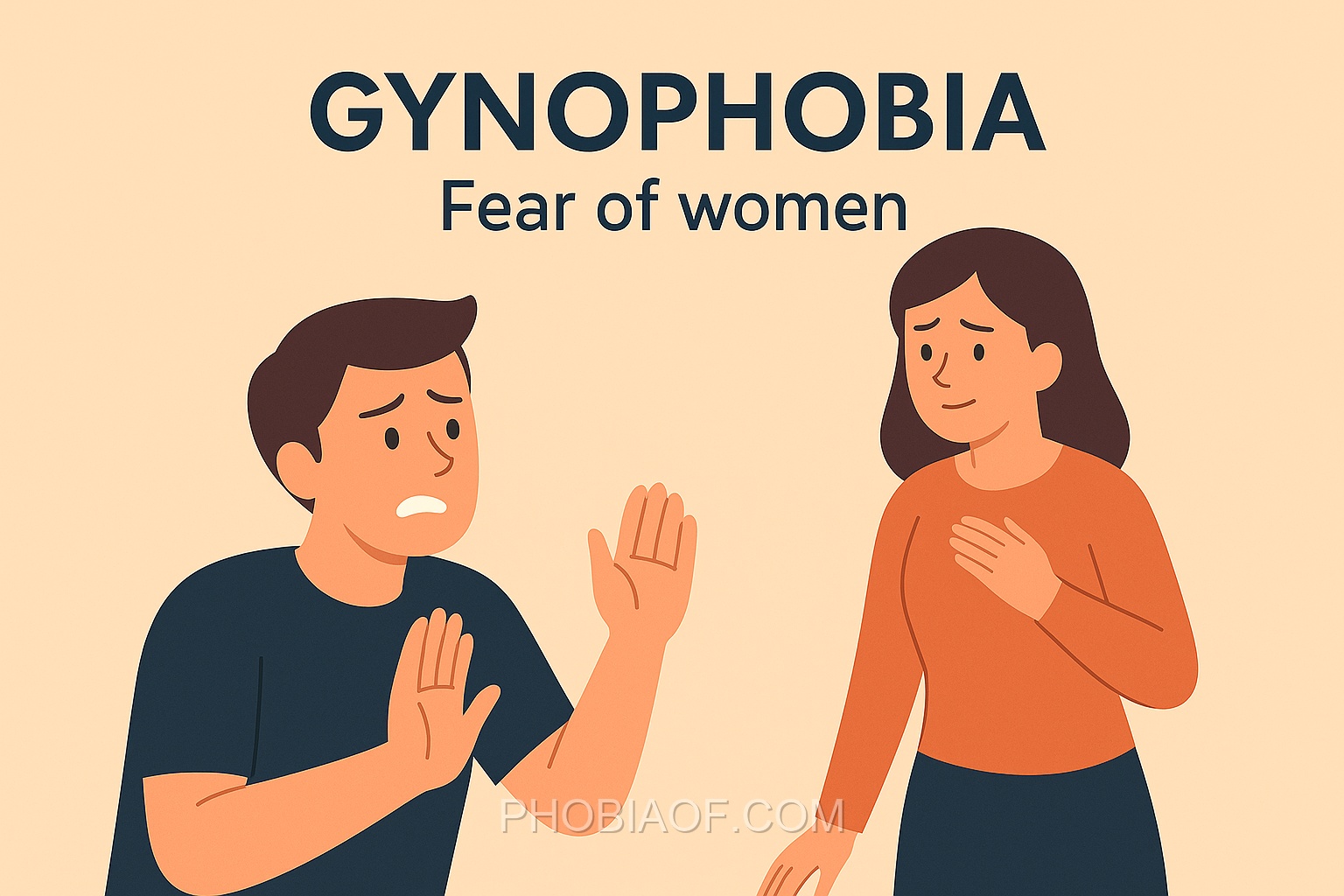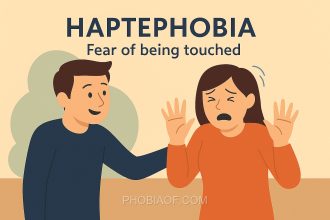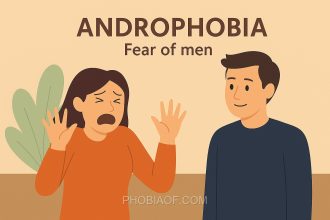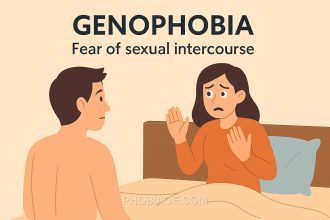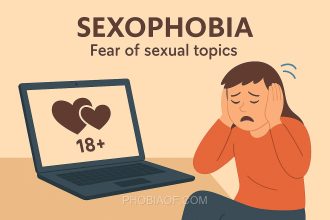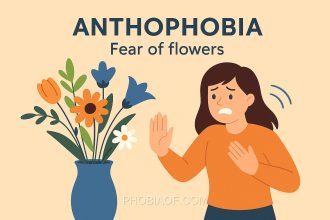Have you ever felt uneasy or anxious in the presence of women? While it might seem unusual to some, this experience is more common than you might think. This overwhelming fear is known as Gynophobia.
Gynophobia is a term derived from the Greek words “gyno,” meaning woman, and “phobia,” meaning fear. It refers to an intense and irrational fear of women. This fear can manifest in various forms, from anxiety and avoidance to panic attacks when encountering women or simply thinking about them.
Imagine living in a world where half of the population triggers anxiety or fear. For those who experience Gynophobia, this is a daily reality. It can significantly impact one’s social life, professional interactions, and even personal relationships. Individuals with this phobia might avoid social gatherings or workplaces to keep their anxiety at bay.
Understanding and acknowledging this fear is the first step toward empathy and support. After all, everyone’s experiences are valid, and with the right help, overcoming such fears is entirely possible.
Here’s a closer look at how Gynophobia can affect individuals:
- Social Isolation: Avoiding social situations where women are present can lead to loneliness and isolation.
- Professional Challenges: The fear can hinder opportunities in workplaces where interaction with women is inevitable.
- Personal Relationships: Forming and maintaining relationships can become challenging, affecting personal life deeply.
If you or someone you know is struggling with Gynophobia, reaching out for professional help is a crucial step. Therapists can offer strategies and support to manage and eventually overcome this fear.
Causes of Gynophobia
Gynophobia, the fear of women, can stem from various causes. Understanding these causes is crucial for addressing and managing this phobia effectively. Below are some common factors that might contribute to the development of gynophobia:
- Genetic Predisposition:
Some people may have a genetic tendency to develop phobias, including gynophobia. This predisposition can make them more susceptible to experiencing intense fears or anxieties.
- Traumatic Experiences:
Negative or traumatic experiences involving women can lead to gynophobia. For example, a distressing event in childhood or an abusive relationship could trigger this fear.
- Learned Behavior:
Gynophobia can also be a learned behavior. Observing family members or peers who have similar fears can influence an individual to develop the same phobia.
- Psychological Factors:
Underlying psychological issues, such as anxiety disorders or low self-esteem, can contribute to the development of gynophobia. These issues may amplify fears or create negative associations with women.
- Environmental Factors:
The environment in which a person grows up can play a significant role. Cultural beliefs or societal norms that portray women negatively can foster fear and apprehension.
Interestingly, some theories suggest that extreme forms of gynophobia may be linked to deeper psychological conflicts or unresolved personal issues. Research in this area continues to evolve, offering new insights into the origins and treatment of this phobia.
Symptoms of Gynophobia
Gynophobia, the intense fear of women, can manifest in various ways, causing significant distress to those affected. This phobia can lead to profound anxiety and can be debilitating, impacting personal and professional aspects of life. Here are some common symptoms associated with gynophobia:
- Intense Fear or Anxiety: A pervasive, overwhelming fear when thinking about or encountering women.
- Panic Attacks: Sudden episodes of intense fear that might include symptoms like chest pain, heart palpitations, or shortness of breath.
- Sweating: Excessive perspiration when around women or when thinking about them.
- Rapid Heartbeat: An increased heart rate triggered by the presence of women or related thoughts.
- Avoidance of Triggers: Steering clear of situations or places where one might encounter women, which may include social gatherings or certain work environments.
- Overwhelming Dread: Persistent feelings of dread or apprehension about interactions with women.
- Nausea or Stomach Distress: Physical illness or discomfort when faced with situations involving women.
- Emotional Distress: Feelings of helplessness, shame, or embarrassment due to the fear.
- Isolation: Withdrawing from social interactions to avoid potential contact with women.
If gynophobia is severe, these symptoms can interfere with daily life, affecting personal relationships, work performance, and overall well-being.
Treatment for Fear of Women (Gynophobia)
Gynophobia, or the fear of women, can be a distressing condition, but it’s important to know that it is treatable and manageable over time. With the right approach and support, individuals can overcome this phobia and lead fulfilling lives.
Therapy Options
Several proven therapies have been effective in treating gynophobia:
- Exposure Therapy: This involves gradually facing the fear of women in a controlled and safe environment. Over time, repeated exposure can help reduce the fear response.
- Cognitive-Behavioral Therapy (CBT): CBT focuses on changing the fearful thoughts associated with women. By identifying and challenging these thoughts, individuals can alter their emotional responses.
- Counseling: Working with a counselor can provide a supportive space to explore the roots of gynophobia and develop strategies to manage it effectively.
Coping Strategies
In addition to therapy, the following self-help techniques can complement treatment:
- Relaxation Exercises: Techniques such as deep breathing, progressive muscle relaxation, and visualization can help calm the mind and reduce anxiety.
- Meditation: Regular meditation practice can enhance mindfulness and decrease overall anxiety levels, making it easier to face fears.
- Support Groups: Connecting with others who have similar experiences can provide encouragement and insight into managing gynophobia.
Medication
In severe cases, medication such as anti-anxiety medications may be prescribed. However, the focus should primarily be on therapy and coping skills to achieve long-term improvement.
Remember, seeking professional help is a crucial step if gynophobia is interfering with your life. Therapists and mental health professionals are equipped to guide you through this process with empathy and expertise.
It’s important to take the first step towards healing. With commitment and support, overcoming gynophobia is entirely possible.
Conclusion
Understanding gynophobia, a fear that can profoundly affect one’s personal and social life, begins with recognizing its causes and symptoms. By gaining insight into these aspects, individuals are better equipped to address the phobia and take proactive steps towards managing it effectively. Knowledge is empowering; it not only fosters self-awareness but also opens the door to appropriate interventions.
It is important to remember that many people successfully overcome or manage their phobias with time, patience, and the right support. If you or someone you know is struggling with gynophobia, consider reaching out to a mental health professional or talking to a doctor. Therapy and support can be instrumental in navigating through the challenges posed by this phobia.
Take heart in knowing that you are not alone, and there is hope for a future where fear no longer dictates your interactions. With courage and support, a more fulfilling and fearless life is within reach.
